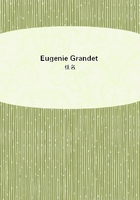
第50章
In all situations women have more cause for suffering than men, and they suffer more. Man has strength and the power of exercising it; he acts, moves, thinks, occupies himself; he looks ahead, and sees consolation in the future. It was thus with Charles. But the woman stays at home; she is always face to face with the grief from which nothing distracts her; she goes down to the depths of the abyss which yawns before her, measures it, and often fills it with her tears and prayers. Thus did Eugenie. She initiated herself into her destiny. To feel, to love, to suffer, to devote herself,--is not this the sum of woman's life? Eugenie was to be in all things a woman, except in the one thing that consoles for all. Her happiness, picked up like nails scattered on a wall--to use the fine simile of Bossuet--would never so much as fill even the hollow of her hand. Sorrows are never long in coming; for her they came soon. The day after Charles's departure the house of Monsieur Grandet resumed its ordinary aspect in the eyes of all, except in those of Eugenie, to whom it grew suddenly empty. She wished, if it could be done unknown to her father, that Charles's room might be kept as he had left it. Madame Grandet and Nanon were willing accomplices in this /statu quo/.
"Who knows but he may come back sooner than we think for?" she said.
"Ah, don't I wish I could see him back!" answered Nanon. "I took to him! He was such a dear, sweet young man,--pretty too, with his curly hair." Eugenie looked at Nanon. "Holy Virgin! don't look at me that way, mademoiselle; your eyes are like those of a lost soul."From that day the beauty of Mademoiselle Grandet took a new character.
The solemn thoughts of love which slowly filled her soul, and the dignity of the woman beloved, gave to her features an illumination such as painters render by a halo. Before the coming of her cousin, Eugenie might be compared to the Virgin before the conception; after he had gone, she was like the Virgin Mother,--she had given birth to love. These two Marys so different, so well represented by Spanish art, embody one of those shining symbols with which Christianity abounds.
Returning from Mass on the morning after Charles's departure,--having made a vow to hear it daily,--Eugenie bought a map of the world, which she nailed up beside her looking-glass, that she might follow her cousin on his westward way, that she might put herself, were it ever so little, day by day into the ship that bore him, and see him and ask him a thousand questions,--"Art thou well? Dost thou suffer? Dost thou think of me when the star, whose beauty and usefulness thou hast taught me to know, shines upon thee?" In the mornings she sat pensive beneath the walnut-tree, on the worm-eaten bench covered with gray lichens, where they had said to each other so many precious things, so many trifles, where they had built the pretty castles of their future home. She thought of the future now as she looked upward to the bit of sky which was all the high walls suffered her to see; then she turned her eyes to the angle where the sun crept on, and to the roof above the room in which he had slept. Hers was the solitary love, the persistent love, which glides into every thought and becomes the substance, or, as our fathers might have said, the tissue of life.
When the would-be friends of Pere Grandet came in the evening for their game at cards, she was gay and dissimulating; but all the morning she talked of Charles with her mother and Nanon. Nanon had brought herself to see that she could pity the sufferings of her young mistress without failing in her duty to the old master, and she would say to Eugenie,--"If I had a man for myself I'd--I'd follow him to hell, yes, I'd exterminate myself for him; but I've none. I shall die and never know what life is. Would you believe, mamz'elle, that old Cornoiller (a good fellow all the same) is always round my petticoats for the sake of my money,--just for all the world like the rats who come smelling after the master's cheese and paying court to you? I see it all; I've got a shrewd eye, though I am as big as a steeple. Well, mamz'elle, it pleases me, but it isn't love."